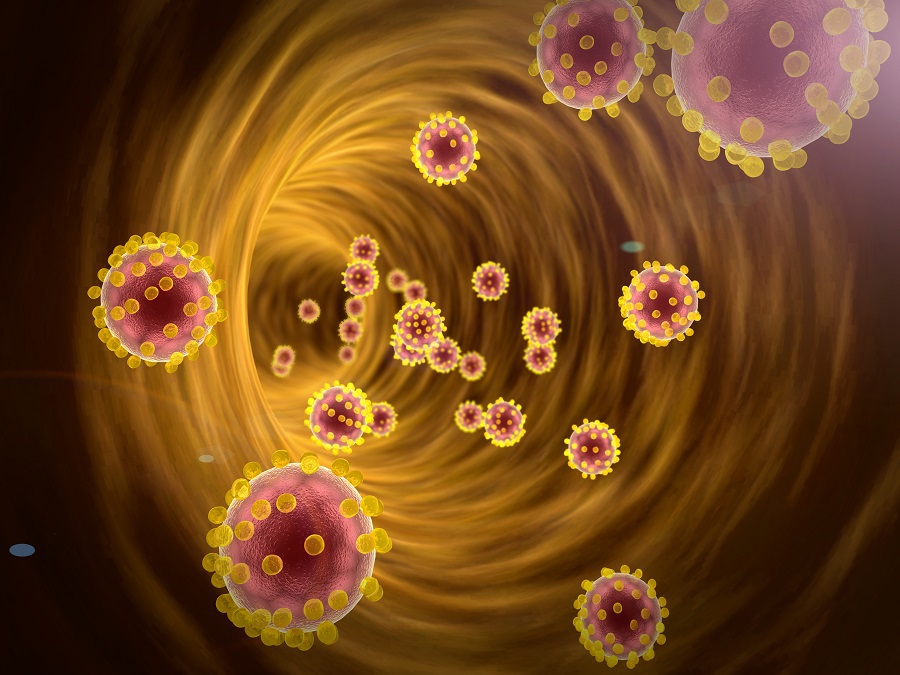
Researchers in the UAE have found that some bacteria in the gut may impact the severity of Covid-19 infections. Certain types of anti-inflammatory bacteria linked to fatty acids metabolism in the intestines strengthen the body’s immune response, indicating that the makeup of the gut microbiome may influence the severity of infection and susceptibility to the SARS-CoV-2 virus.
Read the Arabic story here: https://researchku.com/news-extended/244
The human gut houses a complex community of microbes, a dynamic population of microorganisms that differs from one person to another and impacts the balance of the whole human body. Evidence suggests the human microbiome even modulates the systemic immune response: in some patients suffering from other respiratory illnesses, the gut microbiota affects the immunity and inflammation in the lungs. It’s possible that a similar link exists between Covid-19 and the body’s gut microbiome. A team of researchers explored the role of gut microbiome diversity and its potential as an intervention target in modifying Covid-19 outcomes.
Dr. Mohammad Al Bataineh, Assistant Professor of Molecular Biology and Genetics, Dr. Habiba Alsafar, Associate Professor of Molecular Biology and Genetics and Director of the Khalifa University Center for Biotechnology, and six other KU researchers collaborated with a team of researchers who make up the UAE Covid-19 Collaborative Partnership to investigate the microbiomes of patients presenting with Covid-19. Their results were published in Frontiers in Microbiology.
The gut microbiome exists in a symbiotic relationship with its host, facilitating digestion and aiding in the delivery of essential nutrients to the cells making up the gastrointestinal tract. It helps protect against pathogenic microbes and plays a role in preserving intestinal homeostasis by modulating local and systemic immune responses. It keeps the local immune system in a perpetual vigilant state and remains relatively stable throughout life.
Although most people with Covid-19 recover within weeks of infection, some experience symptoms long after testing negative. Studies show that up to 75 percent of patients hospitalized with Covid-19 described at least one symptom six months after discharge, including respiratory, gastrointestinal, and memory symptoms, as well as fatigue. Although the exact causes for this are unknown, there is increasing evidence that the gut is linked to the severity of infection and that changes to the microbiome persist after the disease passes.
“The role of the human gut microbiome in health and disease conditions is yet to be fully understood. The gastrointestinal symptoms have been linked to the dysbiosis of the intestinal microbiome, where the normal gut bacterial makeup is altered,” Dr. Al Bataineh said. “Invading viruses can alter our immune responses – responses that are usually regulated by the microbiota in the gut. The infections interrupt the normal programming, and create a microenvironment that helps allow these pathogens to proliferate. We think the Covid-19 virus works in this way, altering the regulatory functions of microorganisms in the GI tract. Patients with Covid-19 tend to have lower levels of the beneficial microbes. Whether this is an association or causation is yet to be established.”
“Alterations in the gut microbiome are quite common among people with infectious diseases,” Dr. Alsafar explained. “We weren’t surprised to see this association with Covid-19 too. A substantial portion of patients presented with gastrointestinal symptoms, and when we identified that Covid-19 patients shed viral RNA in their stool, this was another indication that the virus was getting into the gut.”
SARS-CoV-2, the virus causing Covid-19, enters the human body by binding to a protein called ACE2. ACE2 is present in all people, but the quantity of this protein can vary among individuals and in different tissues and cells throughout the body, including the lungs, small intestine and the nasal cavity.
“The most important connection between the gut microbiome and Covid-19 is the involvement of the ACE2 receptor,” Dr. Alsafar explained. “SARS-CoV-2 enters cells through ACE2 receptors, which regulate the gut microbiota, and when disturbed by infection, cause a dysregulation of the intestinal system.”
It is understandable, then, that higher ACE2 expression in the body is correlated with higher infectivity, suggesting that increased ACE2 levels may predispose individuals to Covid-19. In a healthy gut, bacteria called Bacteroidetes are known as ‘good’ bacteria and downregulate the expression of the ACE2 receptor; this has a protective role in Covid-19 infections as it minimizes the amount of ACE2 receptors on the cell surfaces, meaning there are fewer potential entry points for the SARS-CoV-2 virus.
Unfortunately, patients with Covid-19 are more likely to present with lower levels of these commensal bacteria and higher levels of what are known as ‘opportunistic pathogens’. Together, the imbalance results in the gastrointestinal symptoms prevalent in Covid-19 patients, and these perturbations persist even after patients recover.
The data indicates a direct correlation between the composition of the gut microbiome and Covid-19 infection severity. Meaning, the microbial ecosystem before and during infection can help predict severity and mediate the immune response. However, since the gut microbiota were only sampled after they were infected with the virus, the research team was unable to determine whether pre-existing gut dysbiosis contributed to the severe symptoms, or whether the Covid-19 infection itself was the cause of the gut dysbiosis.
“This is very similar to the chicken and the egg question: which came first?” Dr. Alsafar said.
In addition, we know that dietary changes happen when patients fall ill: when people feel tired, diets often shift towards higher energy food in the hope it will help tackle their symptoms. These dietary changes also come with a change in the direct components of the microbiome, so it’s also possible this contributes to the changes in the gut. However, the participants in this study shared similar lifestyle and dietary habits, including dietary fiber intake.
The research team found that various differences in the microbiome could explain susceptibility and infection severity. Gender has been found to significantly correlate with overall microbiome variation, which may partially explain why men are more likely to contract Covid-19. At the same time, gut microbiota changes with age, with the elderly more likely to have lower levels of protective ‘good’ bacteria. One of these bacteria is Lachnospiraceae, which plays an essential role in gut barrier function and immune tolerance, especially among local inflammation. This commensal bacteria may be protecting the younger population from infection.
Lachnospiraceae also produce butyrate, a fatty acid that can strengthen immune response.
“Fatty acids play various critical cellular functions and are implicated in several stages of viral replication,” Dr. Alsafar explained. “They are directly linked to coronavirus spread and multiplication, and we found lower levels of the good bacteria that produce them in patients with Covid-19.”
Further longitudinal studies would be beneficial to understanding the relationship between Covid-19 susceptibility and changes in the gut microbiome, but this study represents the first to investigate a Middle Eastern cohort. The results show a significant compositional and functional shift in the gut microbiota of Covid-19 patients, suggesting interventions that target the gut could be used to mediate Covid-19 infection.
Jade Sterling
Science Writer
22 February 2022






